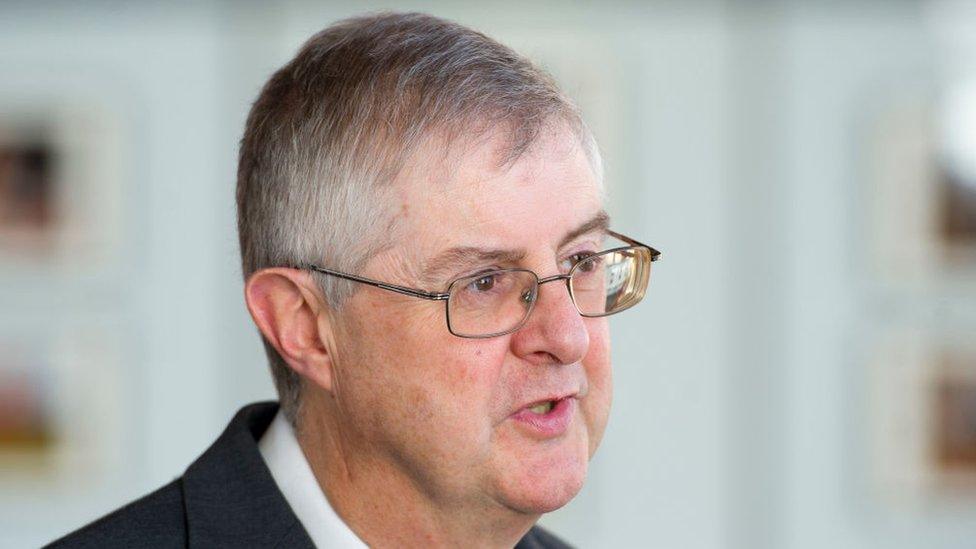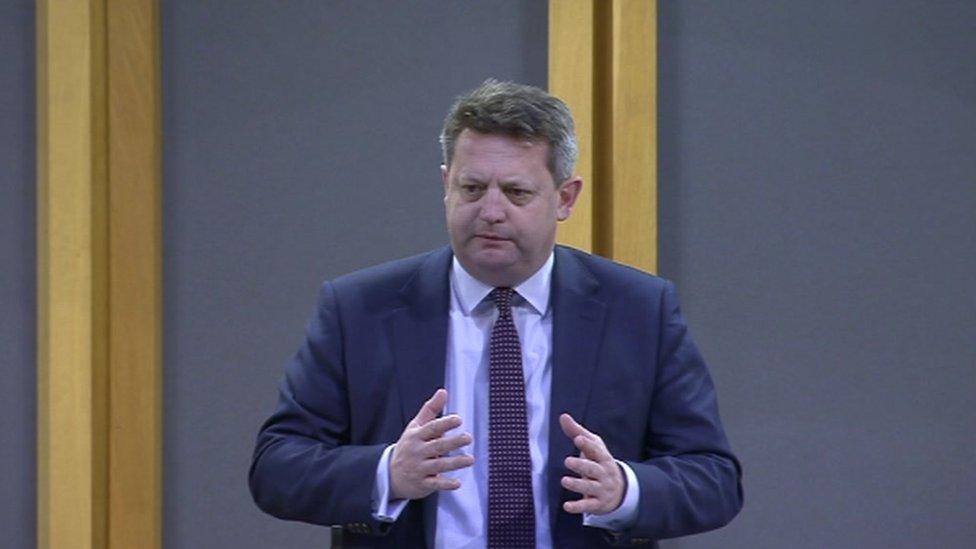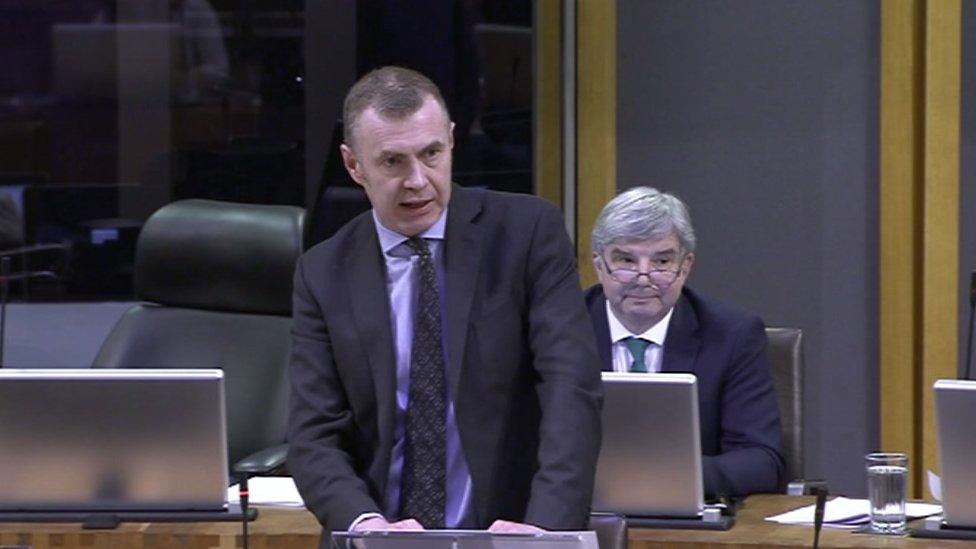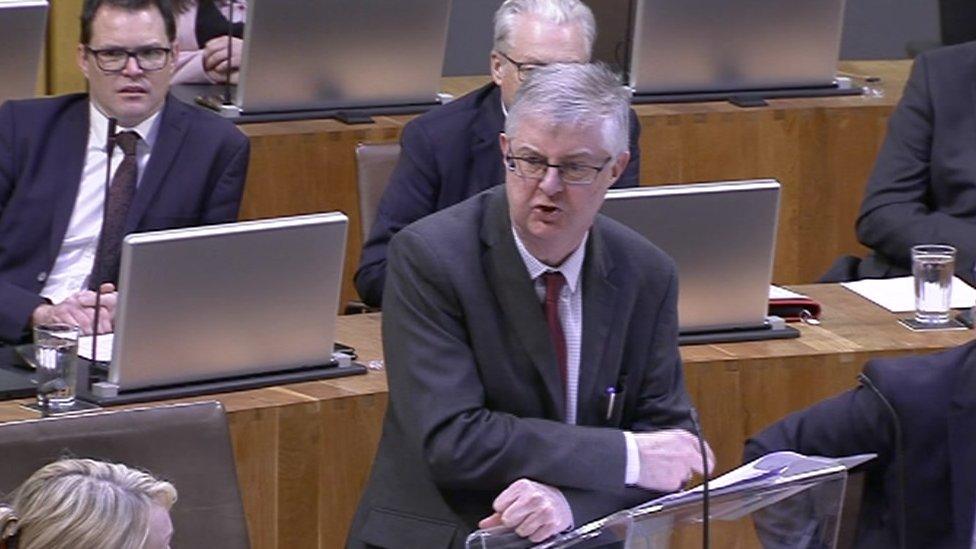New Brexit vote would be divisive, says FM Drakeford prompting row
- Published

Mark Drakeford warned a new referendum could be divisive
Labour's divisions on Brexit erupted in the Senedd on Tuesday after the first minister said a new referendum would inevitably be divisive and may not be decisive.
Mark Drakeford said a new poll would not be straightforward.
The comments prompted a robust response from Alun Davies, Blaenau Gwent Labour AM and a People's Vote campaigner, who said he regretted Mr Drakeford's tone.
Mr Drakeford told him it is not a "difficulty free" option.
Earlier this year the Welsh Assembly, with Labour and Plaid support, passed a motion calling for work on a new poll to start immediately.
The Welsh Government thinks that a deal should still be sought, and a poll held if Commons deadlock cannot be resolved.
But as chaos in the House of Commons has continued, criticism has grown that the Welsh Government has not simply called for a public vote to happen.
Last week a senior Welsh Labour source said Mr Drakeford should be clearer in calling for a new referendum.

Alun Davies said he regretted the first minister's tone
Reacting to the events in the House of Commons last week, Mr Drakeford said the proposition for a new poll "is yet to secure a majority in the House of Commons".
Mr Drakeford told the assembly: "It would require a longer extension than June 30, with all that implies for European elections.
"And a second referendum campaign would inevitably be divisive, with no certainty that it would be decisive."
"If the House of Commons decides that a public vote is the way through the morass that has been created, then we will support it," he added.
Those comments prompted Plaid Cymru leader Adam Price to accuse Mr Drakeford of "rowing further and further away" from the policy agreed in the chamber.
"It's difficult to conceive of a weaker endorsement of the case for a second referendum," he told AMs.

Adam Price accused the first ministers endorsement of a public vote of being weak
Alun Davies said: "I regret very much the tone he used when he described the opportunity to provide for a public vote."
"It is a policy that he himself placed in front of members and asked this parliament to adopt," the AM said.
He said the government had "proactively seek to prepare for a vote to take place".
"I hope you will be very very clear in committing to the policy that the people of this country should have a final say, that the Welsh Government will campaign for a Remain option, and what we will do here is accept there is no such thing as a jobs first Brexit," he added, in a criticism of Jeremy Corbyn's Brexit policy.
Mr Drakeford said he will not "pretend on the floor of this assembly that somehow we are in charge of things".
"In the end a referendum does not lie in the hands of this assembly. We should be honest about that," he said.
Nor did he want to pretend it was a "difficulty free option", adding it did "nobody any good to act as though" issues with a new vote "could be simply be wiped away in a burst of rhetorical enthusiasm".
The first minister appeared to display his own frustration with Mr Davies' comments, flicking his papers as he finished his remarks.
Plaid meeting with Labour
It comes after Plaid Cymru, the SNP and other small parties in the House of Commons met Labour's Jeremy Corbyn.
Plaid said Mr Corbyn only wanted to discuss his own proposals.
Liz Saville-Roberts, Plaid Cymru Westminster leader, said: "The point of the meeting was to discuss the People's Vote with Jeremy Corbyn."
"My disappointment was that the leader of the opposition really only wanted to discuss his own proposal, his own sort of Brexit."
She said he was "constructively ambiguous" but did listen to arguments that a further referendum was needed for ratification of any deal with staying in the EU as an option.
A Labour Party spokesperson said that at a "constructive" meeting the party leaders had "affirmed their common opposition to the government's botched deal or a no-deal outcome".
"Should there not be a majority in parliament for May's deal or a public vote, Corbyn called on the other parties to engage constructively to find a parliamentary majority for a close economic relationship with the EU that can work for the whole country," the spokesperson said.
"The party leaders discussed efforts to ensure May's deal would be put to a public vote if she is able to force it through parliament with threats and phony bribes," they added.
- Published15 March 2019

- Published13 March 2019
